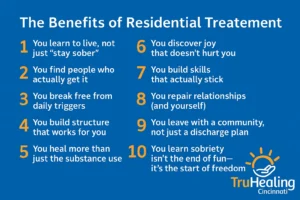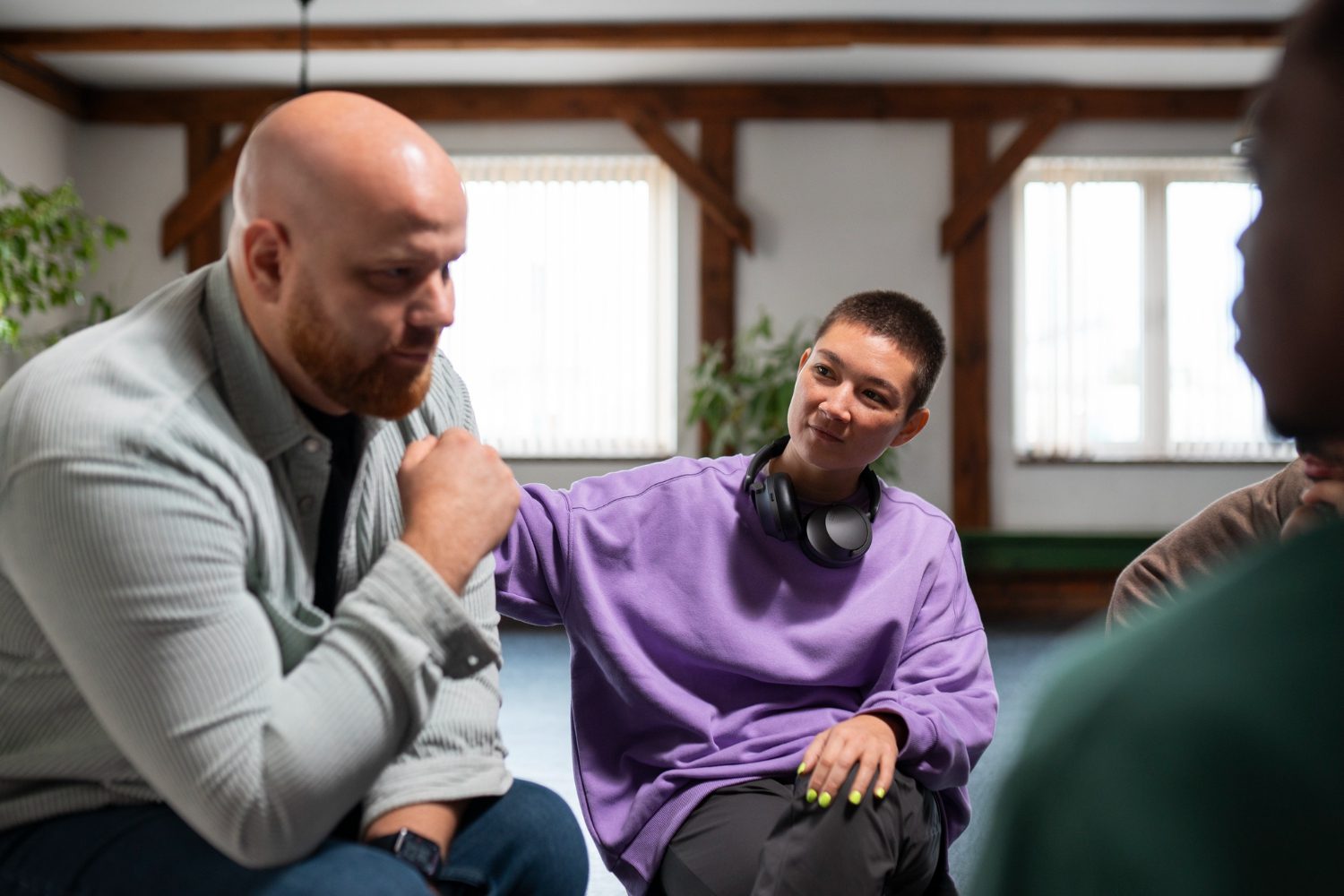When Sobriety Feels Like a Social Exile
If you’re young and sober, you already know the sting of being the “weird one.” Your friends are out at bars, laughing over drinks, posting wild stories. You’re sitting there with your seltzer, nodding along, wondering if you’ll ever feel normal again.
It’s easy to think sobriety equals boredom—or that it strips you of the fun everyone else gets to have. But the truth? Sobriety doesn’t rob you of life—it gives it back. The real challenge is building a life you actually love instead of one you’re just surviving.
That’s where a Residential Treatment Program in Cincinnati comes in. Residential treatment is more than just stepping away from substances. It’s stepping into an environment built to help you heal, grow, and create a foundation for joy.
Here are ten ways it can do that.
1. You Learn to Live, Not Just “Stay Sober”
Sobriety isn’t about counting days—it’s about living them. In treatment, you’re taught how to replace the cycle of chaos with new rhythms that help you live differently.
Instead of obsessing over not using, you learn how to build mornings that feel calm, nights that feel peaceful, and days that feel meaningful. Sobriety becomes less about avoidance and more about creation.
2. You Find People Who Actually Get It
Few things sting more than feeling like the outsider. In treatment, that feeling flips. Suddenly you’re in rooms with people who know what it’s like to feel left out, misunderstood, or trapped in patterns you didn’t choose.
For the first time, you don’t have to explain why parties are triggering. You don’t have to pretend you’re fine when you’re not. That relief—being understood without explanation—can be life-changing.
3. You Break Free From Daily Triggers
Trying to stay sober in the same environment where you used is like trying to heal a wound while standing in dirt. Every day at home, reminders are everywhere—the couch you drank on, the bar you passed after work, the texts from people still using.
Residential treatment gives you a reset. It pulls you out of the noise and into a safe space where your brain and body can breathe. Without the constant triggers, you finally have the room to heal.
4. You Build Structure That Works For You
Chaos fuels relapse. Without structure, days bleed together, and cravings slip in unnoticed. In treatment, you’re given a framework—set wake-up times, meals, groups, downtime—that makes life predictable and safe.
But here’s the best part: the structure isn’t prison. It’s practice. You learn how to carry pieces of that structure back into the “real world” so your recovery has scaffolding to hold it up.

5. You Heal More Than Just the Substance Use
For most young adults, alcohol or drugs weren’t the real problem—they were the coping mechanism. Anxiety, trauma, depression, loneliness—those were the roots. Residential treatment doesn’t just cut off the substance. It gets down into the soil.
Through therapy, groups, and medical support, you begin healing the pain underneath the patterns. Because unless the roots are treated, the weeds grow back.
6. You Discover Joy That Doesn’t Hurt You
Fun doesn’t end in sobriety—it evolves. In treatment, you experiment with ways to feel alive that don’t wreck you the next morning. Hiking, painting, fitness, music, even just laughing with peers in group—all of these become reminders that joy is still possible.
This discovery is huge. It tells your brain: you’re not giving up happiness—you’re learning how to find it without a price tag attached.
7. You Build Skills That Actually Stick
Recovery isn’t just emotional—it’s practical. Residential treatment teaches you life skills you’ll actually use:
- How to navigate conflict without exploding.
- How to deal with stress without reaching for a drink.
- How to manage your time when structure disappears.
- How to actually ask for help.
These aren’t abstract ideas—they’re survival skills for adulthood, sober or not.
8. You Repair Relationships (and Yourself)
Sobriety isn’t just about substances—it’s about rebuilding trust. Maybe you’ve lied to your parents, ghosted friends, or broken promises to yourself.
In treatment, you work on repairing those relationships. You also learn how to extend compassion to yourself. Because healing isn’t just about others forgiving you—it’s about you forgiving you.
9. You Leave With a Community, Not Just a Discharge Plan
Leaving treatment doesn’t mean being on your own. Many programs connect you with alumni networks, peer support, and aftercare planning that helps you transition smoothly.
Instead of white-knuckling sobriety alone, you step into a community that continues long after discharge. You’ll have people to call, groups to join, and familiar faces who remind you you’re not fighting solo.
And if you’re not in Cincinnati, support isn’t far. For example, if you’re looking for a Residential Treatment Program in Lexington, Kentucky, TruHealing also provides care close by.
10. You Learn Sobriety Isn’t the End of Fun—It’s the Start of Freedom
The biggest lie addiction tells is that without substances, life will be boring. But residential treatment proves the opposite: sobriety isn’t an ending. It’s a beginning.
Instead of being chained to cravings, you’re free to imagine a future that’s bigger than hangovers and regrets. Sobriety isn’t punishment—it’s permission. Permission to build a life you don’t just endure, but enjoy.
FAQs About Residential Treatment for Young Adults
1. Isn’t treatment just about quitting substances?
No. Residential treatment goes beyond stopping use. It addresses the emotional, mental, and social pieces of recovery so sobriety feels sustainable, not fragile.
2. What if I feel out of place because I’m young?
Many young adults feel the same way. Treatment programs often group people by stage of life, so you’ll meet peers who understand your struggles.
3. How long do people usually stay in a residential treatment program?
It varies, but many programs last 30–90 days. What matters most is leaving with the skills and support you need for the next step.
4. Will treatment be boring?
It’s structured, yes—but far from boring. Between therapy, activities, groups, and downtime, you’ll find ways to stay engaged and discover new interests.
5. What if I relapse after treatment?
Relapse doesn’t erase progress. Many people return to treatment after a slip and find even greater stability. Alumni programs and continued care help reduce relapse risks.
6. Can treatment really help me enjoy sobriety?
Yes. The goal isn’t just abstinence—it’s building a life you want to stay sober for. Treatment helps you uncover joy, purpose, and healthier ways to cope.
A Final Word: You’re Not Weird, You’re Brave
Choosing sobriety while your peers are still choosing chaos can feel isolating. But it doesn’t make you strange—it makes you strong. You’re the one daring to build something different, something lasting. That courage is the foundation of a life you’ll one day love.
Take the Next Step Today
If you’re ready to move beyond surviving sobriety and start creating a life you actually enjoy, help is here.
Call (888) 643-9118 or visit Residential Treatment Program in Cincinnati, Ohio to learn more about how TruHealing can support your journey.


